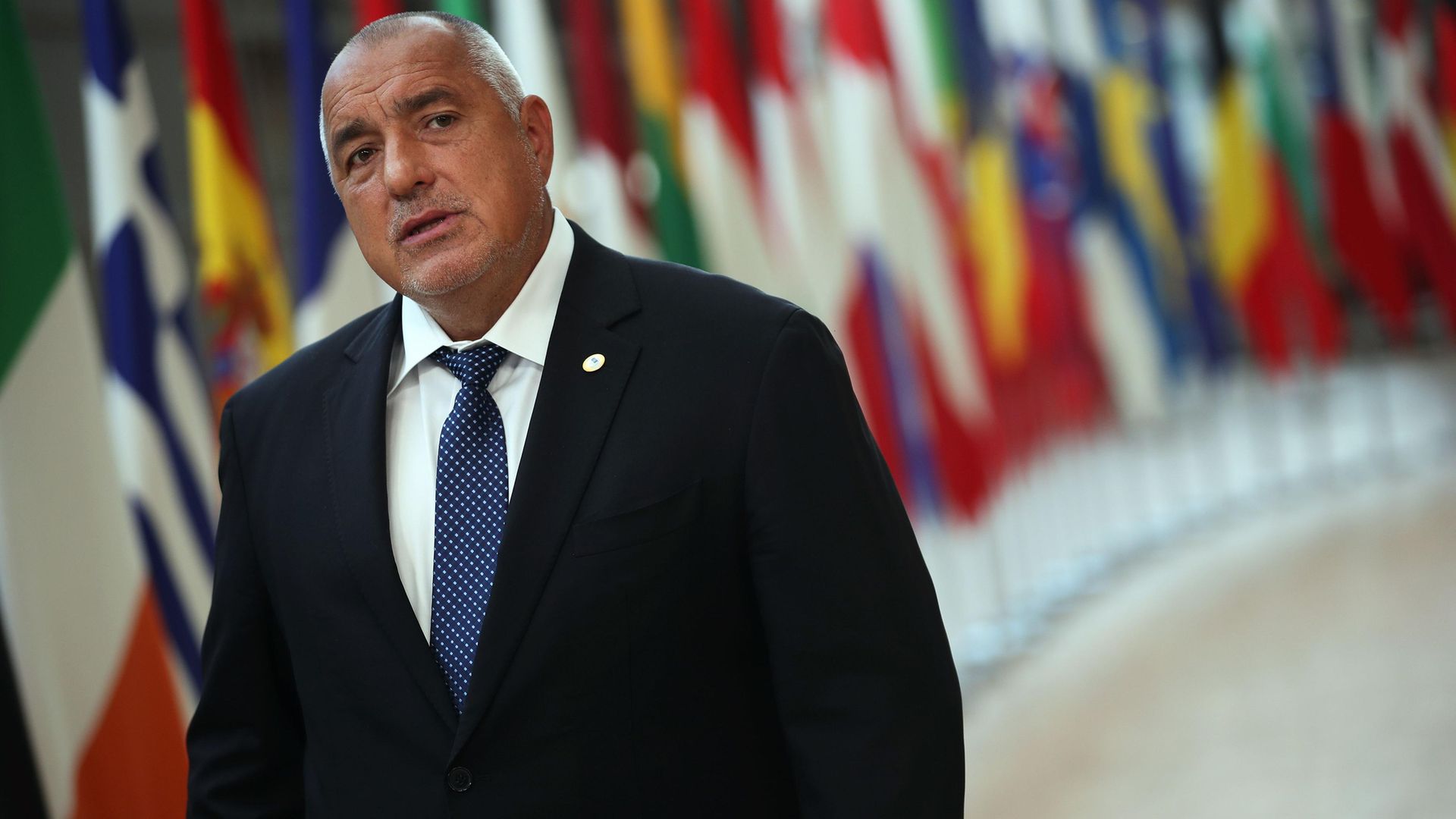
There are few European leaders more colourful and controversial than Bulgaria’s Boyko Borisov. Now, demographic forces unleashed by the pandemic could topple him and offer a new start for the EU’s poorest nation
The beginning of the end for Bulgaria’s bruising former bodyguard turned prime minister Boyko Borisov came last summer, when a photo surfaced showing him in bed with a handgun on his side table and bundles of 500 euro notes stuffed in a half-open drawer.
Despite Borisov’s claims that it was doctored, this image perfectly encapsulated the thuggish corruption with which many Bulgarians have come to associate his government.
It helped to fuel months of mass protests against the political establishment. Now, following elections in early April, the prime minister’s decade of dominance appears to be over and Bulgaria stands uncertainly on the cusp of its biggest political changes since the fall of communism in 1989.
Borisov first came to power in 2009 promising to end his country’s indigence and endemic graft. He has been in office for all bar a total of two years ever since.
His failure to achieve his proclaimed aims can be measured by Bulgaria’s continued plight as the poorest country in the European Union, with a GDP per head 20% lower than neighbours Greece and Romania. By no means coincidentally, Bulgaria is also the lowest ranked EU member state on Transparency International’s global corruption perceptions index.
Allegations of corruption, organised crime connections and interference in the rule of law have dogged Borisov throughout his political career. Leaked reports written by the US ambassador linked him in mafia activities, including drug trafficking, when he was mayor of the Bulgarian capital Sofia in the early 2000s.
Ever since, there have been numerous instances of Borisov’s closest associates from his centre-right Citizens for the European Development of Bulgaria (GERB) party being caught taking bribes or abusing their positions for financial gain. Several were exposed in the 2019 Arteks real estate company scandal as having acquired luxury properties at far below their market value.
Most recently, the ‘eight dwarves scandal’ has included some far from bashful senior public prosecutors being accused of extorting businesses by threatening bogus prosecutions and harm to family members. The scam is named after the Eight Dwarves restaurant in Sofia, which has become a notorious meeting place for the corrupt officials and crime bosses, according to details that some of the business people targeted have been happy to reveal from the relative safety of exile.
Indeed, multiple misconduct has forced a Borisov government out of office once before, in 2013. His skills as a political schemer partly explain how he was able to regain the prime ministership the year after. But he was also helped by the systemic corruption that then prevailed across Bulgaria’s political class. This left the electorate without clean alternatives. Recent developments will make it more difficult for Borisov to engineer a similarly rapid return this time.
In 2017, former air force major-general Rumen Radev was elected president as an independent (albeit with the support of the post-communist Socialists – who have had plenty of corruption problems of their own over the years). Although the presidency in Bulgaria is largely a constitutional and ceremonial role, with the prime minister having most of the responsibility for running the country, Radev has used his platform and limited powers to become a consistent thorn in Borisov’s side.

Borisov is often infuriated by Radev’s criticisms of his failure to tackle corruption and GERB’s suppression of media investigations into it (Bulgaria ranks a lowly 112th on the Reporters Without Borders press freedom index). He has referred to the president as a “dirty old hag of a mother-in-law, the nasty kind”. Hurling sexist insults may be considered part of Borisov’s supposed earthy charm by some Bulgarian men but will only have reinforced his retrograde, bullying image in the eyes of most voters.
A clumsy attempt last year by Borisov’s allies to turn the tables on Radev by ordering an anti-graft raid on the president’s office also backfired. Rather than muddying Radev’s name, it spurred support for the street protests against such abuses of power from Bulgarians across the political spectrum.
These protests were followed by the rise of several anti-corruption parties to challenge Bulgaria’s discredited establishment. In April’s elections, three of these parties crossed the vote threshold required for representation in parliament: There Is Such A People (ITN) (17.7%), Democratic Bulgaria (DB) (9.5%) and Stand Up! Thugs Out! (4.7%) won a combined total of 32% of the vote.
The emergence of these parties is a game changer in Bulgarian politics, but so far only a partial one. The best supported of them, ITN, is led by the popular singer and TV host, Slavi Trifonov. He and his other new party counterparts are configured for protest against the political elite but have yet to develop their own clear programmes of governance for the country.
Even if the three anti-corruption parties could find a way to work together (and they probably could – at least in the short-term task of deposing GERB and Borisov), the fragmented composition of the parliament after the election means their combined 32% is insufficient to form a government. Doing so would require expanding their coalition to include at least one of the three discredited established parties; GERB, the Socialists or the Movement for Rights and Freedoms (DPS – a party originally created to represent Bulgaria’s substantial Turkish minority but which has also often come to be seen as a vehicle for advancing dubious oligarchic interests).
Trifonov has already made clear that he is unwilling to undermine the purpose of his ITN party’s existence by taking such a step. He announced late last month that ITN would reject the mandate offered by president Radev to try to form a government, as they did not have enough respectable potential allies to form a stable administration. Borisov’s GERB (still the largest party with 26% of the vote) has already, predictably, failed to form a governing coalition. With no other plausible option in sight, Radev will probably end up appointing an interim government to guide the country for two months until another election can be held.
Trifonov and his reformist party colleagues may be calculating that the momentum for change in Bulgaria will generate even more support for them next time around. In this calculation, they could be helped by a factor that has regularly influenced elections around Europe over recent years – migration. But in a very different way.
For all their many failings, it cannot be denied that migration has created huge challenges for post-communist Bulgarian governments. Rather than handling an influx of immigrants, Bulgaria has seen 1.3 million of its citizens, around a fifth of its population, depart since 1990. Most of these people have gone to other European countries to seek better employment opportunities. This outpouring of labour was accelerated by the freedom of movement rights Bulgarians acquired when their country joined the EU in 2007.
It could, of course, be argued that fewer people would have felt compelled to leave if Bulgaria’s governments had run the place better. Even so, it is hard to expand an economy whilst haemorrhaging so many of your brightest and best qualified workers. But a recent report by the European Council on Foreign Relations’ (ECFR) suggests these losses could now be stemmed as a side-effect of Covid-19.
The ECFR’s research indicates that up to 500,000 Bulgarians have returned home as a result of job losses and lockdowns during the pandemic. Many of them are considering staying once it is all over. The comments of those interviewed suggest that their decision to do so will be accompanied by demands to change the unfair working conditions, corrupt hiring practices and poor access to public services such as healthcare that are still far too prevalent in Bulgaria. In short, an appetite for political transformation that could provide a new burst of support for the new parties advocating it.
This phenomenon has some recent precedents. In Kosovo, notably, the mobilisation of the diaspora and returnees to the country was crucial in defeating the crony-driven political establishment at the ballot box earlier this year.
There remains much to be done to bring about such change in Bulgaria. The new anti-establishment parties must urgently articulate what they are for and how they will bring it about, as well as what they are against. And the burly Borisov has repeatedly proved how agile he can be in extracting himself from seemingly impossible tight spots.
What happens during the next few months will be crucial for the future of Bulgaria. Up to 15billion euros in additional funding will soon become available to the country from the EU’s Next Generation Covid recovery fund. This provides a huge opportunity for those seeking to transform the country’s trajectory – and quite an incentive for the nefariously inclined to cling to power.
Warning: Illegal string offset 'link_id' in /mnt/storage/stage/www/wp-includes/bookmark.php on line 357
Notice: Trying to get property 'link_id' of non-object in /mnt/storage/stage/www/wp-includes/bookmark.php on line 37






